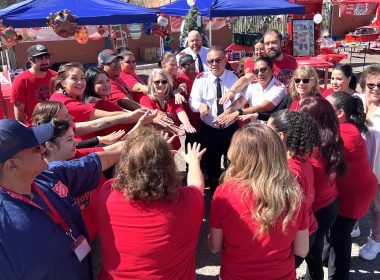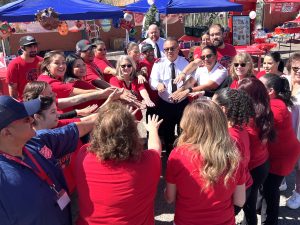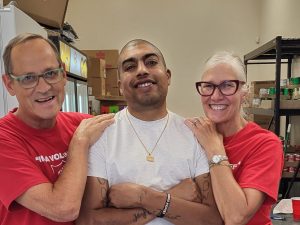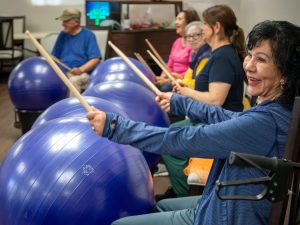This grad is a real 12th stepper
BY DAWN MARKS –
|
|
“Great ideas come in small ways.” That’s how Diana Ford, a manager at a Wal-Mart store in Kennewick, Wash.–a store with 250 associates–describes their employees’ soda can recycling program.
For the past three years, they have used the money earned by recycling empty soda cans in their break area to help support two sisters from Paraguay, Lillian Natividad Gonzales, 8, and Andrea Elizabeth Gonzales, 5, through The Salvation Army’s Overseas Children’s Sponsorship program. The sponsorships provide food, clothing, school and medical supplies to the girls.
Nathaniel Polk, a graduate of the Riverside County Adult Rehabilitation Center (ARC) program, who now works in the maintenance department at the Kennewick Wal-Mart, initiated the can recycling program and getting the sponsorships for the children. The idea originated when he was a resident at the ARC in 1996. There, as in other ARC locations, program beneficiaries sponsor children using money raised by recycling empty soda cans from the residence.
When Nathaniel completed the program, he moved back to his home state and soon after was able to land the first job he’d had in several years. With the full support of the managers, the recycling program was in place within six months. Nathaniel says it takes very little effort to maintain the program. He and other associates take turns hauling the cans to the local recycling center, raising about $40 per month, which sponsors the two children.
The store associates feel good about participating whenever they toss an empty soda can into the bin. Many of them have sent cards to the girls on their birthdays and holidays, and look forward to receiving their progress reports from the director. Nathaniel says, “I can’t tell you how many times I have been blessed because of Andrea and Lillian…I feel we have really made a difference in their lives.”
Major Ivy Hood, program director, says, “The Child Sponsorship Program is about changing the world…one child at a time. We are grateful to the associates of Wal-Mart Store 2101 for their recycling program. We could say they are changing the world one soda pop can at a time. On behalf of the children we express our sincere thanks to the associates of Wal-Mart and wish them God’s blessing.”
For information regarding this program, please contact Major Ivy Hood at Territorial Headquarters; 30840 Hawthorne Blvd.; Rancho Palos Verdes CA 90275-5301.
San Diego ARC trains Portuguese naval officer
 |
|
|
LT. COMMANDER DR. JOSE MOREIRA of the Portuguese Navy and San Diego ARC Director of Rehabilitation Dr. Edward Lataille.
|
|
BY MARLENE GERBER –
The San Diego Adult Rehabilitation Center hosted Lt. Commander Dr. Jose Moreira, Medical Officer in the Portuguese Navy, during a recent three-month stay in the city.
“We appreciate, and were honored that the U.S. Dept. of the Navy referred Lt. Commander Moreira to us for part of his training here, in preparation for opening the first drug and alcohol recovery program in Portugal,” said ARC Director of Rehabilitation Dr. Edward Lataille. “This is the result of years of coordinated effort between the Navy School of Health Sciences Drug and Alcohol Program and the ARC. The ARC is a practicum site for Navy counselors,” he added.
Establishing Portugal’s first freestanding substance abuse treatment program in all of his native country, Dr. Moreira’s pioneering effort in this field will benefit both Navy personnel and civilians alike. Presently, the drug and alcohol protocol in that country falls under the purview of psychiatry in the military, and under occupation medicine for individuals in the workplace. Neither of these offers more than four weeks of treatment. There are no specifically tailored long-term rehabilitation programs for addiction.
He came away with some very positive impressions of the ARC program and the people involved in it. Dr. Moreira found the program structure, from the work therapy performed in the warehouse to the comprehensive counseling support beneficiaries receive, to be very unique. “I was struck by the strength of the program, with the sense of solidarity I found here,” he noted. Prior to his visit, his only knowledge of The Salvation Army was associated with their work in disaster relief. He soon learned of the Army’s role in responding to the personal and societal disaster of substance abuse.
Dr. Moreira reflected on the differences between the program at the ARC and the one he will oversee when he returns to Portugal. The fact that it is primarily geared for the military population implies an existing structure of discipline, family ties and job goals. Here, homelessness, joblessness and lack of self-esteem are major issues. But seeing how individuals can change in a supportive rehabilitation environment–gaining dignity and hope—was a powerful experience for this officer and gentleman.
The strongest components of the ARC program, he observed, and the most transferable, are the discipline and structure. “I am most grateful to Dr. Lataille, Major Doug Williams and the ARC staff for their generosity. It was a most useful and instructive time for me,” Dr. Moreira said.
Sacramento ARC shows how to get really hooked
“Reading is not only a fun and life enriching experience; it is also a necessary skill for employment,” notes Major Betty Gibson, ARC Command.
During her previous appointment to the Sacramento ARC, Gibson wanted to help beneficiaries there who had trouble with reading. In 1996 she started a reading course at the center–held twice a week–using a Hooked On Phonics program donated to the center. This program encourages reading for people from age 4 to 99. Within two years, 20 men at the center either learned to read or were able to enrich their reading skills through these classes.
“Oscar Lee,” says Gibson, “was one of the most motivated men that I had the privilege to tutor in Hooked on Phonics. He had only a minimal recognition of most words when he started the classes just two weeks after arriving at the center. By the time Oscar graduated from the program in March 1998, he had nearly completed the five-part basic reading series and expressed a continued desire to advance his reading skills. Independently, he’s accomplishing his goal, completing over 50 percent of the second phase of the program called ‘Power Builders.'”
Thanks to a new confidence and reading skills, Oscar was hired at the center as a store truck driver upon graduating from the ARC program. He continues to hold this responsible position and work on his recovery and reading programs–one day at a time.












